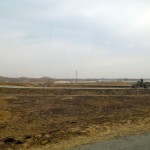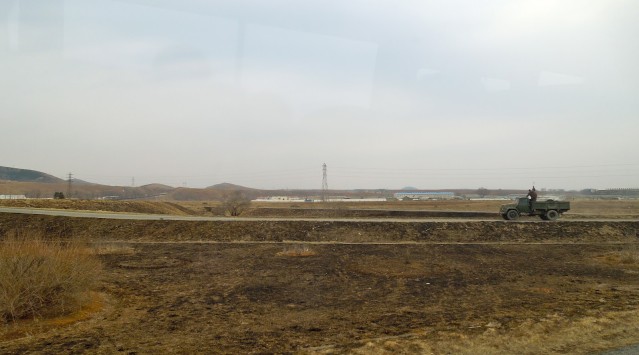by Roger Cavazos, NAPSNet contributor, March 14, 2013
Nautilus invites your contributions to this forum, including any responses to this report.
Even though war talk on the Peninsula is receiving all the attention, there are plenty of other threats in North Korea that can be just as devastating to future stability. In particular, ecological devastation is a sovereign topic which all countries in the region are going to have to address. North Korea has made attempts at dealing with the issues, but as with most governments, there are never enough resources or in-house expertise to address the issues thoroughly. Isolation whether internally or externally mandated only makes the problem more intractable – and expensive. Yet, therein lay the seeds for discussion.
 North Korea presents a dilemma for China. If China is too hard, they can collapse North Korea, although North Korea has proven extremely resilient. Or China has not been that hard. If China’s too soft on North Korea, China’s international image and relations with the US that were carefully crafted through years of diplomacy and diligent efforts are seriously harmed. Changing the discussion topic from nuclear issues to the environment provides a little breathing room and an alternate discussion topic that doesn’t require propaganda speakers turned up to 11. Discussions and even limited cooperation on environmental issues represents a communication pathway in the vein of the Kaesong Industrial Complex.
North Korea presents a dilemma for China. If China is too hard, they can collapse North Korea, although North Korea has proven extremely resilient. Or China has not been that hard. If China’s too soft on North Korea, China’s international image and relations with the US that were carefully crafted through years of diplomacy and diligent efforts are seriously harmed. Changing the discussion topic from nuclear issues to the environment provides a little breathing room and an alternate discussion topic that doesn’t require propaganda speakers turned up to 11. Discussions and even limited cooperation on environmental issues represents a communication pathway in the vein of the Kaesong Industrial Complex.
As an example, North Korea refuses to answer one of the hotlines in the Demilitarized Zone, but still answers the phone at the Kaesong Industrial Complex indicating there is a political ability, possibly even a willingness, to compartmentalize issues. The seemingly contradictory jumble of bombast and action may also indicate shear forces inside North Korea as some elements seek to open up and others thrive on isolation. The more compartments dedicated to non-war, the greater the probability of maintaining strategic stability.
There are many environmental topics to cover that do no harm, benefit all parties and are certainly less sensitive to discuss than nuclear issues. The environment has only decayed so previously suggested topics remain apropos: sustainable food production; water pollution and treatment; restoration of past mining sites and industrial waste dumps; and reforestation and afforestation.
Finding other issues to discuss also establishes positive patterns of interaction. North Korea has few bridges or links to the outside remaining; creating some new bridges can provide new non-kinetic relief valves for North Korea to express displeasure in the future while ameliorating at least some ecological damage in the near term.
A war on the Korean Peninsula, even a limited one, would be an ecological disaster. Even an uneasy peace has taken an environmental toll. Discussing environmental topics is a low cost way to sow seeds for discussions between the parties on and around the Korean Peninsula. The fruits of those discussions are likely sustainable.
The Nautilus Peace and Security Network invites your responses to this report. Please leave a comment below or send your response to: nautilus@nautilus.org. Comments will only be posted if they include the author’s name and affiliation.


